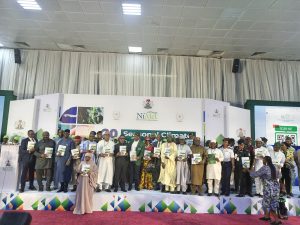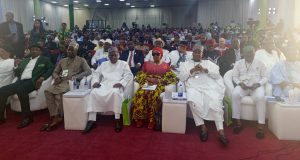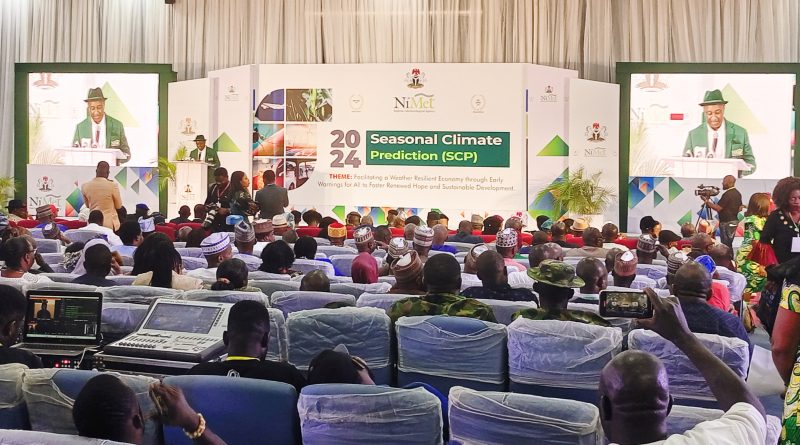NiMet predicts early rains Borno, Abia and Akwa Ibom States, delays in others states in Nigeria
Oru Leonard
The Nigerian Meteorological Agency, NiMet has predicted early rains in Borno, Abia and Akwa Ibom States while there will be delays in other places especially in the North Central States.
NiMet in its 2024 Seasonal Climate Prediction (SCP), has also predicted an early end of rainy season in parts of Yobe, Jigawa, Sokoto, Kebbi, Ebonyi and Lagos States.
In his keynote address, the Minister of Aviation and Aerospace Development, Mr. Festus Keyamo announced this during the public presentation of the 2024 Seasonal Climate Prediction, SCP, and unveiling of related publications in Abuja stated that weather and climate had profound effects on aviation, agriculture, water resources, disaster risk management and infrastructure investment.
The SCP is an annual event coordinated by the Nigerian Meteorological Agency NiMet to provide critical information to help guide decision-making across all sectors of the nation’s economy.
The Minister of Aviation and Aerospace Development, Mr. Festus Keyamo said that the SCP contained the predicted start and end dates of the growing season, expected amount of annual rainfall, temperature forecast, as well as malaria and meningitis vigilance.
He said that Flight safety and efficient air transport operations were largely dependent on accurate weather forecasts, and early warnings.
The Minister explained that the document had been summarized for Policy Makers, and translated into Hausa, Igbo, Yoruba, and Pidgin called for action.
The Chairman Senate Committee on Agric Production Services and Rural Development, Alhaji Mustafa Saliu called for more collaboration with the legislature to ensure adequate legislative backing on impact of climate change on Agriculture.
Speaking earlier at the event, the Secretary General of the World Meteorological Organization (WMO), Celeste Saulo appealed to the Federal Government of Nigeria to pursue the development of a National Framework for Weather, Water, and Climate Services, with a vibrant User Interface Platform for effective engagement and contribution of stakeholders to the production and utilization of Early Warning in the country.

Saulo through his representative stated that the fight against climate change calls for effective public and private stakeholder cooperation and action, adding that the Seasonal Climate Prediction produced by NiMet is a contribution to Early Warning which should be embraced and utilized by all stakeholders in planning and implementation of activities in support of disaster risk management and sustainable development in Nigeria.
“The Federal Republic of Nigeria remains an important partner of WMO and I wish to take this opportunity to renew our deep gratitude for the continued support to the operations of the WMO Representative Office for North, Central and West Africa, and Capacity Development efforts in several Countries in West Africa and beyond”.
On his part, the NiMet Director General/ Chief Executive Officer, Prof. Charles Anosike,explained that accurate weather prediction plays a vital role in the nation’s collective well-being.

He further noted that NiMet has been consistent in its demonstration of unwavering commitment to excellence by ensuring that it delivers the Seasonal Climate Prediction (SCP) early in the year to help Nigerians plan ahead.
The Director General of the Nigeria Civil Aviation Authority, NCAA, Captain Chris Najomo said when the Agency receive NiMet predictions, it generate and send advisory circulars warning pilots and operators of inherent dangers as predicted by NiMet.
The Chief Executive Officer of United Nigeria Airline, Professor Obiora Okonkwo said that Airline Operators can support NiMet to propagate weather predictions will emphasized the need for sustained communication among all stakeholders to protect lives
Farmers from different parts of the country were on hand to give testimony of how they benefited from timely predictions of NiMet.
The NiMet SCP document also contains detailed predictions for temperature in the first five months of the year, predictions for the dry spell and little dry season, as well as predictions for Malaria and Meningitis. These predictions are accompanied by explicit details, especially focusing on the socio-economic implications associated with each projection.




